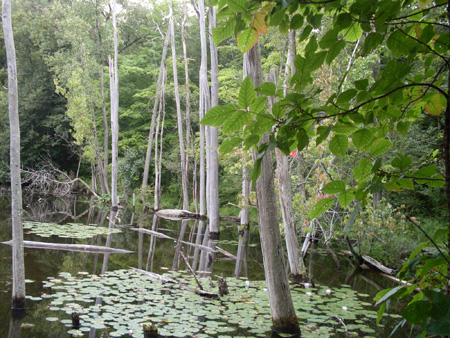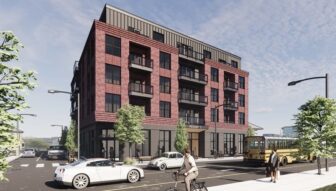The following was provided by Tony LaCasse of the Friends of Allandale Woods.
A broad coalition of neighborhood residents and groups are suing the city of Boston to enforce its own zoning laws, in order to protect one of its most pristine parks. A group of abutters supported by the Friends of Allandale Woods Coalition has filed suit in Suffolk Superior Court to stop the building of 18 — million-dollar plus condominiums on a two-acre lot, which is zoned for single-family residences.
The picturesque parcel with a 19th century farmhouse overlooks Allandale Woods, a Boston Parks forest on the West Roxbury/Jamaica Plain border. In December, the Zoning Board of Appeal (ZBA) approved more than 50 variances that waived nearly every building guideline specifically established for the scenic neighborhood.
Despite the opposition of six Boston city councilors and all of the adjacent neighborhood associations and councils, the ZBA approved the building of 45-foot tall, luxury townhouses in exceptional density on a steep slope overlooking a large section of this 86-acre woods. In contrast with the rural character of the neighborhood, all front yard requirements have either have been waived by the city or approved for use as one of more than 40 parking spaces.

The ZBA okayed once prohibited basement units and approved not having sidewalks for the development’s narrow access road. The lawsuit states that the developer, the Wonder Group, had submitted “not one scintilla of evidence” to meet the very specific requirements for hardship that must be met to grant even one variance, much less more than 50, on such a sensitive and controversial site.
The project claims of sustainability are greatly exaggerated as it is completely car dependent with more than two parking spaces allocated per unit, and the site is not near public transportation. The energy efficient design features of the structures are laudable, but rarely does a housing project come with such high external environmental costs and risks. Allandale Woods is the jewel of Boston Parks Urban Wilds program, which are properties managed for their sense of seclusion in the city. These towering townhouses will loom over and be seen throughout the eastern quarter of the woods effectively removing 20 acres from an urban wild’s primary purpose.
The proposed development is also immediately upslope of one of Boston last two vernal pool sites. These extremely sensitive wetlands are a major feature of Allandale Woods and had been previously described by Boston Parks as “the most important ecologically significant site in the city of Boston.” The principal reason that there are only two vernal pool sites left in the city is they that are easily disturbed and destroyed. An abutter offered to pay for a hydrological study of the site as part of the permitting process, to which the developer declined.

The Wonder Group has promoted the project on its claims of being the first “net zero energy” development in Boston. However, the BPDA on its very own website lists a 14-unit project in Roxbury’s Highland Park neighborhood and others as the city’s first.
There are also concerns about affordability and the lack of affordable housing. The developer has stated that there would be more than $20 million in capital spending, thus the prices for these luxury townhouses will be well in excess of $1,000,000 each. Nearly six months after having the project approved by the BRA board, the developer reduced the number of units from 20 to 18, which under the city’s complex affordable housing formula allowed the developer to reduce the number of onsite affordable units from three to one.
The case will be argued and decided on the technical points of zoning law, but this particular project has become a political flashpoint in the neighborhoods as to whether zoning has any relevance to Boston city officials.
Polly Selkoe, a member of the 550-household Jamaica Hills Association said, “If the ZBA can completely ignore the designated zoning uses and density allowed in a neighborhood and also fails to protect environmentally sensitive conservation land, then what is the sense of having zoning in Boston.”
The ZBA’s Allandale Woods decision is the capstone case on a mountain of neighborhood discontent over what is widely perceived as a developer-driven process that exploits insider relationships. Projects that dramatically exceed zoning are completely “pre-baked” between the BPDA and the developers before there is any meaningful public input. Many citizens openly question the value of showing up to public hearings.
For those Boston citizens who feel shut out of the city’s development process, we want the Allandale Woods lawsuit to be their case — a citizen-based effort to protect a public park. Hopefully in the long run with judicial correction, the city of Boston will prioritize thoughtful planning with meaningful public input as an important priority.




